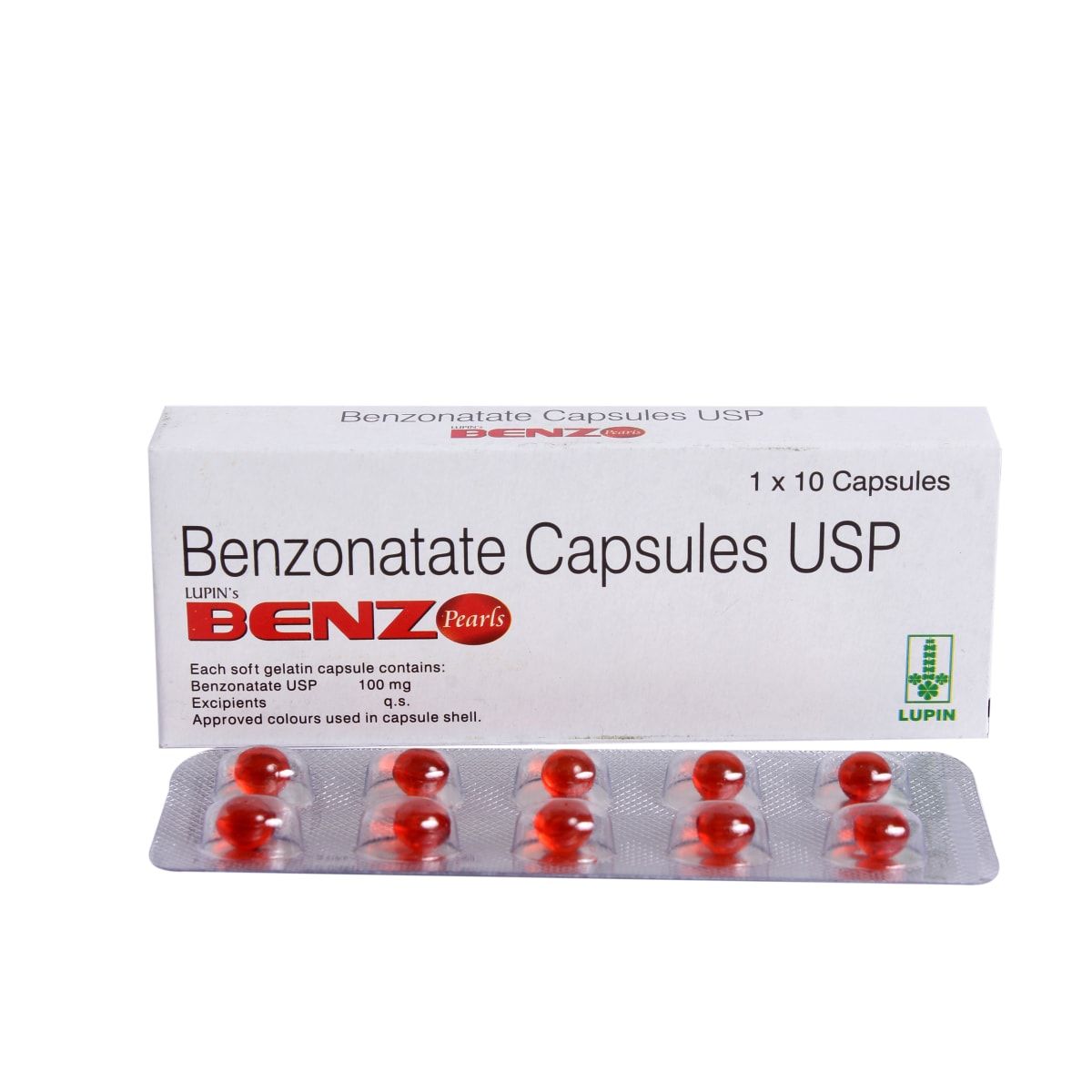Benzonatate
About Benzonatate
Benzonatate belongs to a class of medication called an anti-tussive (relieve cough) primarily used to treat dry cough. A cough is a reflex action that helps to clear any foreign irritant or mucus in the throat. Mostly, a cough lasts for a short time (two to three weeks), so it is acute. But sometimes, if it is persistent for more than eight weeks, it can lead to chronic cough. Dry cough refers to a cough where there is no mucus or secretion along with cough.
Benzonatate contains Benzonatate, which acts peripherally by anaesthetizing the stretch receptors located in the respiratory tract, lungs, and pleura by dampening their activity and reducing the cough reflex at its source. Usually, Benzonatate is prescribed for the short-term treatment of dry cough. It does not treat chronic coughs caused by smoking, emphysema, or asthma.
Benzonatate is available only with your doctor's prescription. Benzonatate can be taken with or without food. The doctor will decide the dose and duration of Benzonatate depending on your condition. The most common side effects of Benzonatate are dizziness, drowsiness, sleepiness, confusion, and nausea. Most of these side effects of Benzonatate do not require medical attention and gradually resolve over time. However, if the side effects persist or worsen, please consult your doctor.
Do not take Benzonatate if you are allergic to Benzonatate or any other medicines. If you are pregnant or breastfeeding, please inform your doctor before starting Benzonatate. Benzonatate should be given to a pregnant woman only if clearly needed. Caution should be exercised when Benzonatate is administered to a nursing woman. Safety and effectiveness in children below the age of 10 have not been established. Accidental ingestion resulting in death has been reported in children below age 10. Keep out of reach of children. If your condition does not improve or your cough comes back or occurs with a fever or rash, please visit the doctor immediately, as this could be serious.
Uses of Benzonatate
Medicinal Benefits
Benzonatate is primarily used to treat dry cough. It contains Benzoate, a cough suppressant. It relieves cough by acting directly on the lungs and breathing passages. It may also work on the cough centre in the brain. Benzonatate is generally prescribed for short-term treatment of dry cough.
Directions for Use
Storage
Side Effects of Benzonatate
- Dizziness
- Drowsiness
- Sleepiness
- Confusion
- Nausea
- Rash
- Shortness of breath
Drug Warnings
Do not take Benzonatate if you are allergic to Benzonatate or other medicines. Keep Benzonatate out of reach of children. Safety and effectiveness in children below the age of 10 have not been established. Accidental ingestion of Benzonatate resulting in death has been reported in children below age 10. Signs and overdose symptoms have been reported within 15-20 minutes, and death has been reported within one hour of ingestion. If accidental ingestion occurs, seek medical attention immediately. Benzonatate is chemically related to the para-amino-benzoic acid class (local anaesthetics such as procaine and tetracaine). It has been associated with adverse CNS effects, possibly associated with a prior sensitivity to related agents or interaction with concomitant medication. If pregnant or breastfeeding, please inform your doctor before starting Benzonatate. Benzonatate should be given to a pregnant woman only if needed. Caution should be exercised when Benzonatate is administered to a nursing woman.
Drug Interactions
Drug-Drug Interactions: Benzonatate may interact with medication to treat muscle spasms (tizanidine) and local anaesthetics (procaine, tetracaine).
Drug-Food Interactions: Avoid alcohol intake with Benzonatate as it may cause increased drowsiness, dizziness, and lack of concentration.
Drug-Disease Interactions: Caution should be exercised in patients with psychiatric or emotional conditions.
Drug-Drug Interactions Checker List:
Safety Advice

Alcohol
unsafeAvoid consumption of alcohol with Benzonatate as it may increase drowsiness. Please consult a doctor before consuming alcohol with Benzonatate.

Pregnancy
cautionBenzonatate is a category C pregnancy drug. Its safety in pregnancy is unknown, so it should be taken only if prescribed by a doctor.

Breast Feeding
cautionBenzonatate is a category C pregnancy drug. Its safety in breastfeeding women is unknown, so it should be taken only if prescribed by a doctor.

Driving
unsafeBenzonatate may cause drowsiness or tiredness in some people. Therefore, drive only if you are alert after taking Benzonatate.

Liver
cautionTake Benzonatate with caution, especially if you have a history of Liver diseases/conditions. The dose may be adjusted by your doctor as required.

Kidney
cautionTake Benzonatate with caution, especially if you have a history of Kidney diseases/conditions. The dose may be adjusted by your doctor as required.

Children
unsafeSafety and effectiveness in children below the age of 10 have not been established
Habit Forming
Diet & Lifestyle Advise
- Take Benzonatate as directed by the doctor and at regular intervals. Do not use other over-the-counter medications, herbal or vitamin supplements without informing your pharmacist or doctor when you take Benzonatate.
- Know your triggers like allergens, such as pollen, dust and food items that make your asthma and other respiratory diseases severe.
- Quit smoking and avoid passive smoking. Smoking also reduces the effectiveness of the medicine.
- Drink extra fluids while you take Benzonatate to help loosen congestion and lubricate the throat.
- Eat a healthy diet and exercise regularly to strengthen your breathing muscles and boost your immune system.
- Learning breathing exercises will help you move more air in and out of your lungs.
Special Advise
- Strictly keep away from children.
- It is recommended that you inform your doctor that you are taking Benzonatate before undergoing any medical tests or surgery.
- If your cough persists for more than one week, stop using $ name and consult your doctor.
Patients Concern
Disease/Condition Glossary
Cough: Cough is a reflex action that helps to clear any foreign irritant or mucus in the throat. Mostly, a cough lasts for a short time (two to three weeks), so it is acute. But sometimes, if it is persistent for more than eight weeks, it can lead to chronic cough. If the cough is accompanied by blood or barking cough, this could be serious and require medical attention. The most common causes of cough are cold/flu, asthma, emphysema, and COPD (chronic obstructive pulmonary disease). Also, some medications, especially angiotensin-converting enzyme inhibitors used for hypertension, are known to cause cough.
FAQs
Benzonatate is used to treat dry cough. It contains Benzonatate, a cough suppressant. It relieves cough by acting directly on the lungs and the breathing passages. It may also work on the cough centre in the brain.
Yes, Benzonatate may cause drowsiness, so operating any machinery or driving a car, doing an activity that requires concentration and alertness should be avoided.
No, never take more than the prescribed dose of Benzonatate. It may lead to nausea, vomiting, drowsiness, dizziness, unsteadiness, changes in vision, difficulty in breathing, fast heartbeat, hallucination, seizures and coma.
You are not recommended to stop taking Benzonatate without consulting your doctor as it may worsen the cough or cause recurring symptoms. Therefore, take Benzonatate for as long as your doctor has prescribed it, and if you experience any difficulty while taking Benzonatate, please consult your doctor.
Store Benzonatate according to the instructions on the leaflet and away from direct sunlight. Do not freeze and dispose of unused medicine. Keep it out of reach from pets and children.
Yes, Benzonatate can effectively relieve cough associated with conditions like the common cold or bronchitis. It works by numbing the throat and lungs, which helps suppress the cough reflex. While it does not treat the underlying illness, it can relieve persistent coughing, making it easier to rest and recover. However, its effectiveness varies from person to person, and it should be used as a doctor prescribes.
Benzonatate is not an antibiotic, benzodiazepine (benzo), steroid, or controlled substance. It is a non-narcotic cough suppressant classified as an antitussive. It works by numbing the stretch receptors in the respiratory tract, thereby reducing the cough reflex.
Benzonatate is a non-narcotic cough suppressant and is not considered addictive. Regarding its gluten content, the available information does not specify whether it is gluten-free. If you have gluten sensitivity, you must consult your doctor to confirm whether the specific brand or formulation of benzonatate you are prescribed is free from gluten.
Benzonatate does not contain codeine, sulfa, or aspirin. It is a non-narcotic cough suppressant used to help relieve coughing. If you have allergies or sensitivities to certain ingredients, please consult a doctor before taking Benzonatate.
Benzonatate is mainly used as a cough suppressant. It works by numbing the throat and lungs to reduce the cough reflex. While this numbing effect may temporarily relieve a sore throat, it is not specifically intended for that purpose. Suppose your sore throat is due to an infection. In that case, it's essential to consult a doctor for appropriate treatment, as it will not address the underlying cause.
Benzonatate generally does not have significant interactions with Sudafed, Mucinex, Robitussin, Ibuprofen, Guaifenesin, or Tylenol Cold. However, combining it with dextromethorphan or promethazine may increase sedation, so caution is advised. It is best to consult a doctor before taking multiple medications together to prevent potential side effects and drug interactions.
The side effects of Benzonatate include headache, dizziness, nausea, stomach upset, constipation, stuffy nose, itching or rash. Most of these side effects gradually resolve over time. However, consult a doctor if any of these side effects persist or worsen.
Benzonatate belongs to the group of medications called anti-tussives. It is a non-narcotic cough suppressant that works by numbing stretch receptors in the respiratory passages, lungs, and pleura, effectively reducing the cough reflex at its source.



